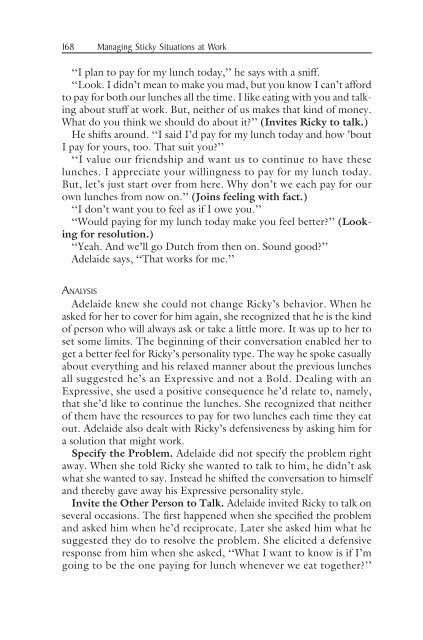Managing Sticky Situations at Work
Managing Sticky Situations at Work
Managing Sticky Situations at Work
Create successful ePaper yourself
Turn your PDF publications into a flip-book with our unique Google optimized e-Paper software.
168 <strong>Managing</strong> <strong>Sticky</strong> <strong>Situ<strong>at</strong>ions</strong> <strong>at</strong> <strong>Work</strong>‘‘I plan to pay for my lunch today,’’ he says with a sniff.‘‘Look. I didn’t mean to make you mad, but you know I can’t affordto pay for both our lunches all the time. I like e<strong>at</strong>ing with you and talkingabout stuff <strong>at</strong> work. But, neither of us makes th<strong>at</strong> kind of money.Wh<strong>at</strong> do you think we should do about it?’’ (Invites Ricky to talk.)He shifts around. ‘‘I said I’d pay for my lunch today and how ’boutI pay for yours, too. Th<strong>at</strong> suit you?’’‘‘I value our friendship and want us to continue to have theselunches. I appreci<strong>at</strong>e your willingnesstopayformylunchtoday.But, let’s just start over from here. Why don’t we each pay for ourown lunches from now on.’’ (Joins feeling with fact.)‘‘I don’t want you to feel as if I owe you.’’‘‘Would paying for my lunch today make you feel better?’’ (Lookingfor resolution.)‘‘Yeah. And we’ll go Dutch from then on. Sound good?’’Adelaide says, ‘‘Th<strong>at</strong> works for me.’’ANALYSISAdelaide knew she could not change Ricky’s behavior. When heasked for her to cover for him again, she recognized th<strong>at</strong> he is the kindof person who will always ask or take a little more. It was up to her toset some limits. The beginning of their convers<strong>at</strong>ion enabled her toget a better feel for Ricky’s personality type. The way he spoke casuallyabout everything and his relaxed manner about the previous lunchesall suggested he’s an Expressive and not a Bold. Dealing with anExpressive, she used a positive consequence he’d rel<strong>at</strong>e to, namely,th<strong>at</strong> she’d like to continue the lunches. She recognized th<strong>at</strong> neitherof them have the resources to pay for two lunches each time they e<strong>at</strong>out. Adelaide also dealt with Ricky’s defensiveness by asking him fora solution th<strong>at</strong> might work.Specify the Problem. Adelaide did not specify the problem rightaway. When she told Ricky she wanted to talk to him, he didn’t askwh<strong>at</strong> she wanted to say. Instead he shifted the convers<strong>at</strong>ion to himselfand thereby gave away his Expressive personality style.Invite the Other Person to Talk. Adelaide invited Ricky to talk onseveral occasions. The first happened when she specified the problemand asked him when he’d reciproc<strong>at</strong>e. L<strong>at</strong>er she asked him wh<strong>at</strong> hesuggested they do to resolve the problem. She elicited a defensiveresponse from him when she asked, ‘‘Wh<strong>at</strong> I want to know is if I’mgoingtobetheonepayingforlunch whenever we e<strong>at</strong> together?’’















